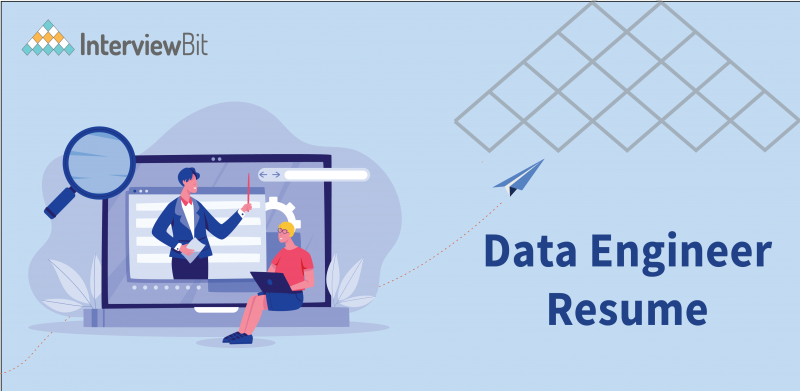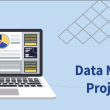A resume is a must-have to reach your target & get an interview call. The first round of screening of resumes is based on identifying the key skills & experience that are wanted from the profile. This would be done through keywords and phrases. A resume must be able to easily impress the resume screener for it to make it to the next round which is the actual interview. When it comes to elite job roles with high responsibilities and expectations, such as Data Engineer, you have to give it all.
In this article, we are going to help you make the best Data Engineer Resume for yourself. But before that, you should know who are Data engineers and why do companies hire them.
Who are Data Engineers and Why Do Companies Hire Them?
Data engineering is the practice of designing and constructing large-scale data collection, storage, and analysis systems. It is a broad field that has applications in almost every industry. Organizations can collect massive amounts of data, but they need the right people and technology to ensure that the data is in a highly usable state by the time it reaches data scientists and analysts. Working as a data engineer can provide you with the opportunity to make a tangible difference in a world where we will be producing a large amount of data (about 463 exabytes per day by 2025). Fields like Machine learning and deep learning can’t thrive unless data engineers process and channel that data. Data engineers build systems that collect, manage, and convert raw data into usable information for data scientists and business analysts to interpret in different settings.
Confused about your next job?
Some tasks you will have to perform as a data engineer:
- Acquire datasets that are relevant to the needs of the business.
- Create algorithms to convert data into usable, actionable information.
- Work with management to understand the company’s goals.
- Develop new data validation techniques and data analysis tools.
Why Should You Become a Data Engineer?
A career in this field can be rewarding as well as challenging. You’ll play an important role in an organization’s success by making data more accessible to data scientists, analysts, and decision-makers. To create scalable solutions, you’ll need to use your programming and problem-solving skills. Data engineering is also a lucrative profession.
You must be very excited to create your resume. Let’s not wait anymore and start creating an awesome resume for you.
Data Engineer Resume
In general, you can make your resume logical or functional, with a chronological listing of experiences and a functional listing of experiences depending on talents. The format you use should be determined by the talents and experience you want to highlight. For someone with a lot of experience, a functional resume might be ideal to assist in prioritizing the abilities needed for the job.
The first format does not grab the attention of the reader and therefore, should be avoided.
Basic Information
Name, address, phone number, and email address are some elements of basic and contact information. You might want to create a separate email address for job hunting. Make sure that whichever email address you pick displays professionalism. Avoid email addresses like ballerboi64@— or techsavy123@—. A formal email address is far more employable than an informal one, according to studies.
Let’s say your resume header looks like this:

Although it is completely fine, it lacks details. Look at the example below to see how minor changes can have a big impact. Also, note the GitHub link. It provides a decent sign of what you do in your spare time.
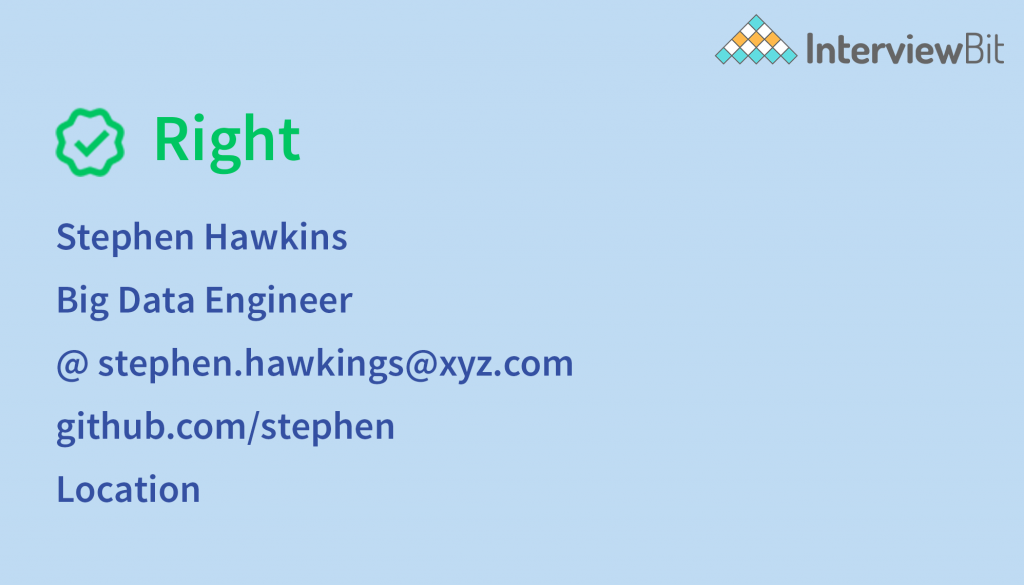
Pro Tip: Always include your Github, Stack overflow, or personal portfolio in the header of your Data Engineer resume. Overall, it establishes a genuine bond between you and the people who are reviewing your resume.
So far, you’ve made a good first impression. Let’s make sure you maintain the same impact throughout your resume.
Tell your story through summary
The importance of professional summaries in your job application cannot be overstated. They tell your narrative in a nutshell, allowing employers to get a quick glimpse at your skills and how you can help their company.
Consider the summary below:

This professional profile says nothing about you or your abilities to a potential employer. But have a look at this summary:

The above summary gives the recruiting manager a clear picture of what you’re working on right now. Also, it helps you stand out from the crowd when you specify the number of years of experience you have upfront. The summary also gives you a taste of your genuine passions, which is beneficial to both recruiting managers and you.
Skills
This is the portion where you shine. Any IT-related resume should include technical skills. Your Data Engineer skills area should include any courses, certifications, programming languages, and software tools that you are familiar with. You may emphasize the skills you need to thrive at the job in your resume if you know what they are. The following are some of the most significant skills for data engineers:
Coding
Coding is a highly prized ability that is required for the majority of data engineering jobs. Many organizations expect candidates to have a working knowledge of programming languages such as Java, Python, C++, Ruby, Pearl.
Data Warehousing
Data engineers are responsible for storing and analyzing massive amounts of data. That’s why, in a data engineering profession, familiarity with and experience with data warehousing platforms like Panoply or Redshift is essential.
Knowledge of Operating System
A Data Engineer should have an ample understanding of operating systems like Windows, Linux, macOS, or Solaris.
Database Systems
Data engineers should be well-versed in database administration. Because Structured Query Language (SQL) is the most generally used solution, learning it thoroughly is tremendously beneficial in this industry. There are other database solutions like Bigtable or Cassandra as well.
Data Analysis
What many companies are searching for is data engineers that are well-versed in analytics software, particularly Apache Hadoop-based solutions like MapReduce, Hive, Pig, and HBase.
Machine Learning
While data scientists are more concerned with machine learning, understanding the fundamental concepts can help you better understand the needs of data scientists on your team.
Big Data Tools
Data engineers do not only work with traditional data. They are frequently tasked with managing large amounts of data. Hadoop, MongoDB, and Kafka are some popular tools and technologies that are evolving and vary by company.
Cloud Computing
As companies increasingly trade physical servers for cloud services, you’ll need to understand cloud storage and cloud computing.
Critical Thinking
What is the most important skill required to be a data engineer? That’s right, problem-solving.
They help organizations to implement and support new data platforms and applications, integrate disparate sources of information from different data systems, and create a cohesive picture of the business through data analytics.
Managerial Ability
As data engineers, you’ll ensure that the team’s analysis tools are up-to-date and efficient. You’ll coach less experienced staff and support them in their professional development. You’ll also be responsible for monitoring ongoing updates or repairs to database systems.
Communication Skills
One of the most important traits of a successful data scientist or data engineer is communication skills. As a data engineer, your primary job function is to translate discoveries in your reports into actionable steps for other team members to follow. This requires a high level of collaboration, which means you work with colleagues who are both technical and non-technical to develop strategies, review results, and find solutions for the company. Hence, you need to communicate clearly—and ensure you’ve earned the respect from others you’ll need from day one.
Time Management
Time management is necessary since you will be dealing with tight deadlines and multiple projects at the same time.
That being said avoid using details that are too generic in your resume. Here are a few keywords of technical skills that are required for the job of a Data Engineer.
- Python
- Hadoop
- Java
- Scala
- Hive
- Apache Airflow
- Apache Spark
- Apache Kafka
- NoSQL
- SQL
- Cloud platforms
- Big Data
- ETL
- Tableau
- Linux
- CDH
- HDFS
- SPARK
- Impala
- Sqoop
- Map Reduce
- Oozie
- Putty
- Netezza
- YARN
- Talend
- Informatica
- Power BI
- Hibernate
- RHEL
- Agile Methodology
- MongoDB
- Cassandra
- HBase
- MySQL
- Oracle DB
A sample of how to present your skills:
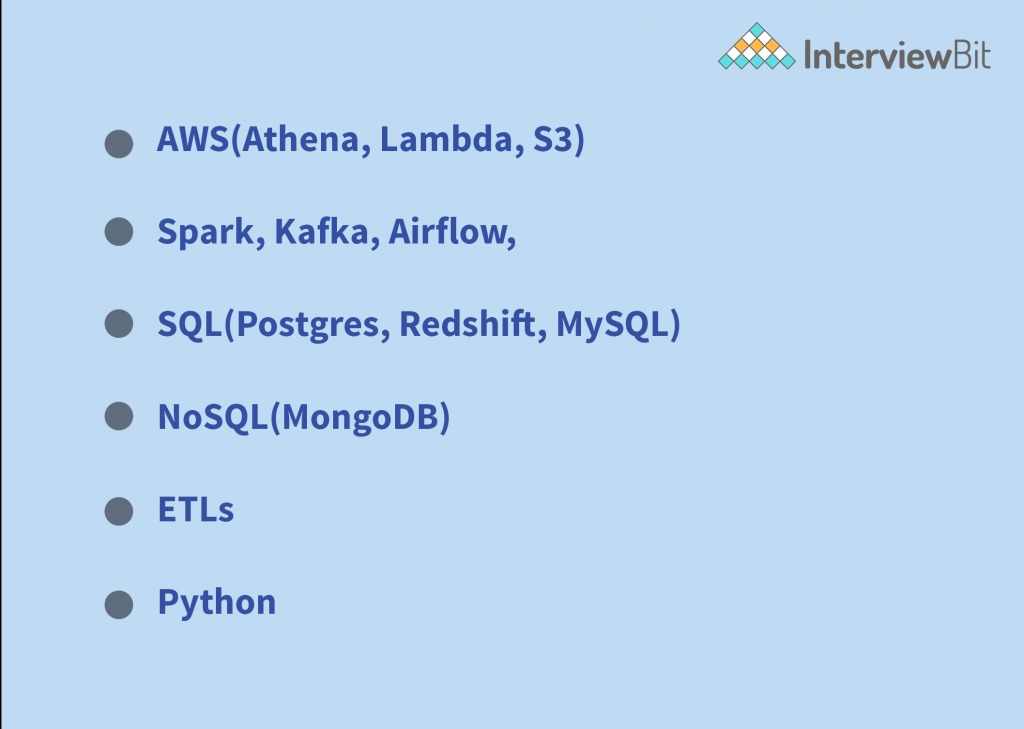
Pro tip: Avoid tools that are generic in the skill section of your resume and include industry-leading tools.
Experience
The work experience portion of a resume for data engineers is the most crucial. Employers prefer candidates who have worked on real projects. Include details such as the name and location of the company, your dates of work, and your job title. You can mention internships or university projects if you have little work experience. When outlining your role in each position, consider how you may stress the positive impact you had on the job. If you have a lot of technical knowledge, try to keep this section short and sweet, focusing on your specific tools and abilities experience relevant to the job you’re looking for.
A few things that you should keep in mind:
- Start with your most recent or current position. Then list your previous places in reverse chronological order.
- Include your job title, firm’s name, dates worked in bullet points and a “major achievement” that no recruiter should overlook.
- In older and less important positions, use fewer bullet points.
- Concentrate on results rather than tasks, and track your progress.
We have provided some sample of the including experience section below:
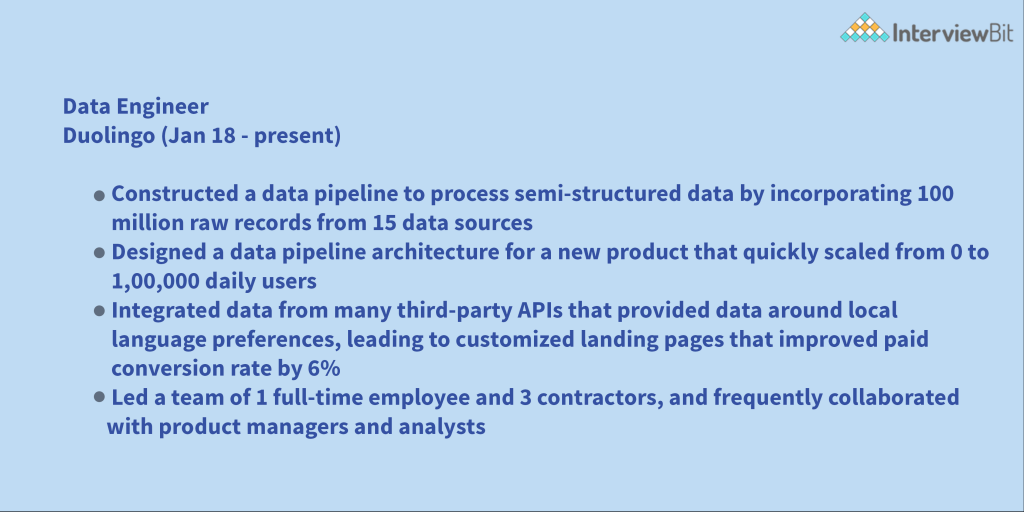
Pro Tips:
- Remember to mention the software and framework versions.
- Using the job description as a guide, you can adjust your experience and specify the tools and abilities that the company requires.
Education and Certifications
In this part, including any university degrees, such as a bachelor’s degree in computer science, mathematics, engineering, or a similar discipline. You can also provide the name and location of your university, the degree you received, and the years you spent there when explaining your education.
Certificates are crucial for technical jobs like Data Engineering, and they should be included in every CV you prepare for a job in the industry. So if you have any certifications, licenses, or proud awards to show off, don’t hold back!
Here are a few things you should keep in mind:
- If you have more than 5 years of work experience, list only the college name, degree, graduation date, major, and minors.
- If you have less experience, include more in the education section of your resume. You can include relevant coursework or accomplishments.

Proofreading
You can proofread your resume using spelling and grammatical checking software, by asking a friend or family member to look it over for you, or by waiting a few days and rereading it yourself before submitting it. To demonstrate good attention to detail, it is critical to eliminate inaccuracies in your resume. Slight carefulness can save you from embarrassment in front of the interviewer.
You should also keep the following things in mind:
- Choose the finest resume font- a standard typeface like Cambria, Calibri, Arial, Times New Roman, or Helvetica that will render appropriately on most machines.
- For normal text, use single line spacing and font size of 11pt or 12pt. For section titles, increase the font size to 14pt—16pt. Make sure your resume margins aren’t too narrow.
- Use italics for supporting material and bold text to attract attention to specific words or phrases.
- If you are going to print your resume, focus on the quality of the paper.
Pro Tip: It’s always a good idea to have a second set of eyes look at your resume.
Sample Resume
We have provided sample Data Engineer resumes for your reference below.
Conclusion
When it comes to the best Data Engineer resume, your resume should contain a summary of all of your experience, education, and skills in an easy-to-read format. The recruiters want evidence that you have been successful in your previous positions and that you know what it takes to be successful in the position that they are trying to fill. So prepare yourself before applying for a job with a Data Engineer resume. Research the company and tailor the content of your resume to each job application. Improve the effectiveness and quality of your Data Engineering resume by making it more visually appealing. Remember that a well-presented resume is like a dish well garnished and served. Be sure to pay attention to typography to have a fashionable resume, do not submit too long resumes (maximum 2 pages) as it may reduce your chances of getting selected for an interview. Make sure that you include everything you have done on your projects, emphasize the hard skills you have in your resume. Make sure that you also present your soft skills (communication skills and the ability to learn new languages are extremely important).
Key Takeaways
- Create a resume in reverse chronological order.
- The resume header should also include a link to your portfolio.
- Avoid using generic details, be specific.
- In your resume summary, demonstrate your passion and specific accomplishments.
- Separately list your skills and certifications.
- Include certifications, but prioritize coursework and projects relevant to the roles.
- If you have a lot of work experience, care to mention only those which are relevant for the role.
Frequently Asked Questions
Q. What is the job of a data engineer?
A. Data engineers build systems that collect, manage, and convert raw data into usable information for data scientists and business analysts to interpret in a variety of settings. Their ultimate goal is to make data available so that businesses can use it to evaluate and optimize their performance.
Q. What skills are required for a data engineer?
A. You should have these skills to become a data engineer:
- Programming Languages
- SQL Databases
- Apache Airflow
- Apache Spark
- ELK Stack
- Apache Kafka
- Amazon Redshift
- Hadoop Ecosystem
Q. Do Data Engineers code?
A. You shall be required to code but not nearly as much as a software engineer.


